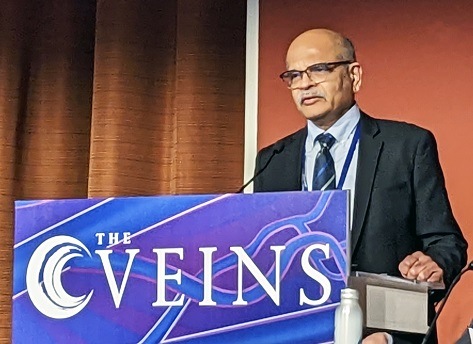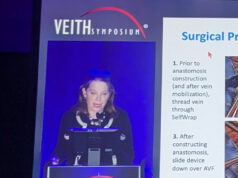
An update from the first-in-human study assessing the Amplifi vein dilation system (Artio Medical) was delivered by Surendra Shenoy (Washington University School of Medicine, St Louis, USA) during the first-ever late-breaking clinical trials session at this year’s Venous Endovascular Interventional Strategies (VEINS) conference (30–31 October, Las Vegas, USA).
“It is probably the most exciting thing to have happened in vascular access since the description of the arteriovenous fistula [AVF] for the first time in 1966,” Shenoy noted during his presentation. “It is poised to make a huge impact for our patients.”
The Amplifi vein dilation system has been designed to overcome the age-old problem of AVF non-maturation in the forearm. While native fistulas are still widely considered the optimal, initial vascular access strategy in the majority of patients—particularly ones created at the forearm, due to reduced complication rates and the fact they preserve proximal sites for future accesses—these anastomoses are often associated with a high likelihood of maturation failure, whereby the access is not successful in providing a usable conduit for dialysis treatments.
In addition, small vein diameters are strongly correlated with maturation failure. An Artio press release details that 6mm veins have a 75% probability of maturation versus just 10% for 3mm veins. As such, the company’s Amplifi device, comprised of a wearable pump and catheters, is intended to improve AVF maturation rates by instigating vein dilation prior to creation of a fistula. This is achieved by delivering non-pulsatile, supraphysiologic wall shear stresses within the patient’s target vein to stimulate flow-mediated dilation.
In the prospective, non-randomised, single-arm, open-label, first-in-human study determining the safety and effectiveness of the Amplifi system, an initial cohort of five end-stage kidney disease (ESKD) patients were treated at Sanatorio Italiano (Asunción, Paraguay) between the first and third quarters of 2021. Positive results from these early investigations, including forearm and upper-arm mean cephalic vein diameters more than doubling across a mean treatment duration of 8.6 days, were also disclosed by Shenoy himself at last year’s Vascular InterVentional Advances (VIVA) conference (4–7 October 2021, Las Vegas, USA).
At VEINS 2022, Shenoy delivered data on a second groups of patients treated through the third quarter of this year in the first-in-human trial, reporting a mean treatment duration of 6.3 days, and noting that all AVFs in this most recent cohort were created in the forearm. The speaker further stated that no serious device-related or procedural adverse events were seen here. Treatment with the Amplifi system resulted in a 151% increase in cephalic vein diameter, with a 134% concomitant increase in flow rate, he added, and AVFs made with Amplifi-treated veins were fully mature within two weeks and all patients were cleared for haemodialysis using their AVFs by week six.
The Amplifi vein dilation system is currently in development and therefore not available for commercial use, according to Shenoy, and further data bolstering these promising early signals are required—with a US Food and Drug Administration (FDA)-approved investigational device exemption (IDE) trial of the device now planned and set to begin enrolment in 2023.











